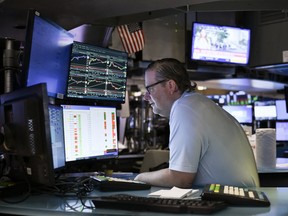5 reasons long-term investing beats day trading
June 19, 2025
Peter Hodson: Long-term investors have a much higher probability of building wealth steadily over time

Article content
Have you ever dreamed of quitting your full-time job and becoming a day trader of stocks? Sure, you have. It’s a common dream. Or, should we say, fantasy. Day-trading is exceptionally difficult. One can be successful for a period of time. But repeatable, long term success is rare. In fact, after 40 years in the investment business, we cannot name one single hugely successful day trader. Certainly, no day traders make it on the list of the wealthiest people in the world. There are so many reasons why long-term investing is better. Let’s take a look.
Article content
Story continues below
Article content
Lower risk and greater stability:
Article content
Article content
Article content
Long-term investing allows you to ride out market fluctuations and avoid the volatility that day traders must constantly navigate. Over extended periods, markets have historically trended upward, so even if you experience temporary losses, you are more likely to recover and see growth if you invest for the long term. Day trading, by contrast, exposes you to the risk of significant losses within minutes or hours due to rapid price movements, and most retail day traders lose money. Many day traders use stop loss orders to limit their damage on bad days. This protects them, but most investors know that the very best stocks tend to have very high volatility. Selling on a downtick of course can take you out of a long-term huge winner.
Article content
Compounding returns and wealth building:
Article content
One of the most powerful aspects of long-term investing is the ability to benefit from compounding returns. By holding investments for years or decades and reinvesting dividends or profits, your money grows exponentially over time. Compounding is less effective in day trading because positions are rarely held long enough to accumulate significant returns from reinvested gains. Gains are typically re-deployed into new positions, which, more often than not, are not as good as the position just sold.
Article content
Story continues below
Article content
Lower costs and taxes:
Article content
Read More
-
5 of the big stock winners of the past 20 years with eye-popping returns
-
5 things to know about a dreaded U.S. recession
-
Advertisement embed-more-topic
Story continues below
Article content
Long-term investors make fewer transactions, which means lower brokerage fees, bid/ask slippage and commissions. For U.S. investors, long term gains are taxed more favourably than short-term gains (not an issue for Canadian investors). Frequent buying and selling in day trading can result in substantial costs that erode profits. But it is the taxes that hurt the most. If you have a successful day trade, that’s great. But if you are in a 50 per cent tax bracket, because of capital gains taxes, you now have about 25 per ent less capital deployed in the market than a long-term investor. This reduced level of capital is a giant disadvantage to traders. Long term investors simply compound their capital and pay no taxes (other than on dividends) until their position is sold.
Article content
Less time and emotional stress:
Article content
One of the issues with day traders and their lack of success is that most, after a while, get the feeling that they ‘need’ to be trading. But not every day provides good trading opportunities. Like a gambler in Vegas, staying at the table (or trading) longer than you should is a pretty-much guaranteed way to lose money. Day traders have difficulty stepping away from the game, as they fear missed opportunity. Long-term investing requires much less daily involvement. You do not need to monitor the market constantly or make split-second decisions. This makes it ideal for individuals with full-time jobs or other commitments, and it also reduces the emotional stress associated with reacting to every market movement. Day trading, on the other hand, is highly time-intensive and emotionally demanding, often leading to burnout and impulsive decisions.
Search
RECENT PRESS RELEASES
Related Post






